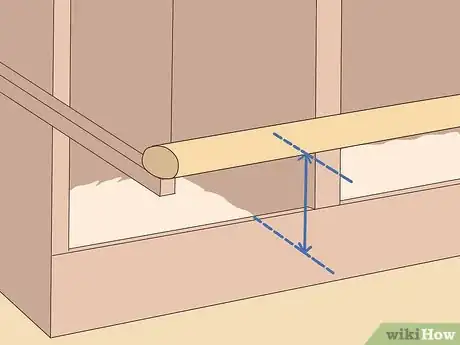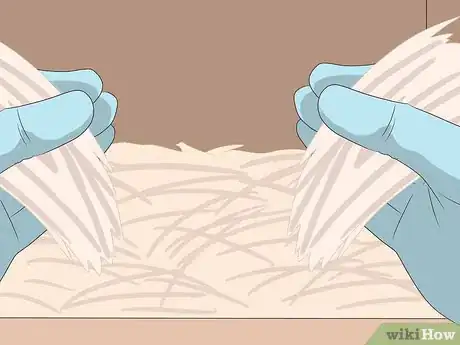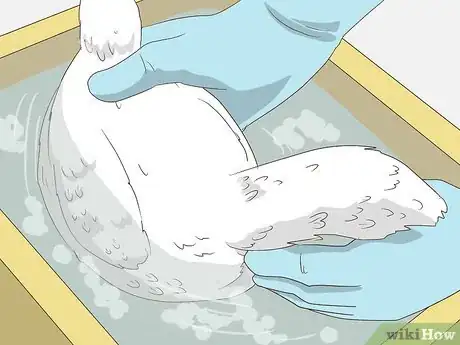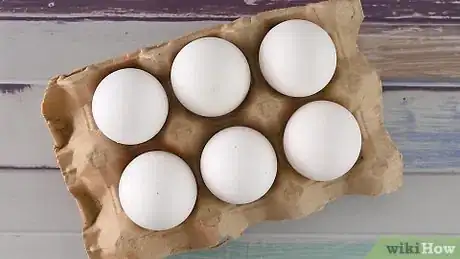This article was co-authored by wikiHow staff writer, Hunter Rising. Hunter Rising is a wikiHow Staff Writer based in Los Angeles. He has more than three years of experience writing for and working with wikiHow. Hunter holds a BFA in Entertainment Design from the University of Wisconsin - Stout and a Minor in English Writing.
wikiHow marks an article as reader-approved once it receives enough positive feedback. In this case, 90% of readers who voted found the article helpful, earning it our reader-approved status.
This article has been viewed 246,308 times.
Learn more...
If you're raising chickens, you'll find new eggs in the coop every day. As you collect your eggs, they might be covered in mud, nesting material, and chicken droppings and need to be cleaned. Try scrubbing the eggs with a dry scouring pad or brush first to see if you can get them clean. If using a dry brush doesn't work, you may need to wash them with hot water.
Steps
Keeping Eggs Clean
-
1Collect eggs daily so they don't get as dirty. Check your chicken's nest box at least once during the day to see if it laid any eggs. Take the eggs immediately when you notice them so they don't get covered in droppings or dirt when your chicken sits on them. Throw away any broken eggs right away so the nest box doesn't get too dirty.
Collect eggs at the same time each day so you don't forget or leave any behind.
-
2Position your nesting boxes lower than the chicken's roosting area. your chickens will sleep on the highest perch inside their coop, so eggs there could break easier. Position your nest boxes so they're lower than the roosts to prevent your chickens from accidentally breaking or eliminating on your eggs.
Tip: Put the nest boxes on the side furthest from the coop entrance so your chickens' feet aren't as dirty when they lay eggs. This helps keep your eggs slightly cleaner.
Advertisement -
3Change the nesting material every 1-2 weeks so it stays clean. Inspect the hay or bedding you use in your nest boxes to see if it's still clean. If you notice a lot of mud, chicken droppings, or feathers, replace the nesting material so it's fresh. If the nesting material doesn't look dirty after 2 weeks, replace the material anyway to prevent bacterial growth.[1]
- Use a paint scraper if there are droppings or mud stuck on the bottom of the nest box.
-
4Bathe your chicken if it has a dirty vent. The vent is on the chicken's backside and is where the eggs are laid from. Fill a shallow tote bin with warm water and a few pumps of dish soap, and mix it together until it's sudsy. Set the chicken inside the tote bin and lather its feathers with soap. After you've washed its backside, put the chicken in another tote filled with clean water to rinse off the soap. Pat the chicken dry with a towel before using a blow dryer on the lowest setting.
- If your chicken's vent gets extremely dirty again, consult with your vet to see if there are any bacterial infections.
Dry-Scrubbing the Eggs
-
1Throw away any eggs that are cracked or broken. Sort through the eggs you collected and inspect them for any damage to the shell. Look for cracks or breaks where bacteria could easily get inside the egg. Get rid of all the eggs that are damaged so you don't contaminate the ones that are good.[2]
If the eggs are covered with a thick coating of other broken eggs or chicken droppings, it may be easier to throw them away than it is to clean them.
-
2Remove dirt and residue from the eggshells with a scouring pad. Hold the egg carefully in your hand so you don't accidentally drop or break it. Use your dominant hand to lightly scrub the surface of the egg with a scouring pad or a sponge. Work in small circular movements across the surface of the egg to break off any stuck-on residue. Once you scrub any dirt or droppings off the shell, the egg is safe to eat.[3]
- You can also use an egg brush or a small piece of 220-grit sandpaper to clean your eggs as well.
- Sanitize or replace your scouring pad once after 4-5 eggs in 1 gallon (3.8 L) of water mixed with 1 tablespoon (15 ml) of bleach.
-
3Store your eggs at room temperature or in the fridge. Once you clean your eggs, set them in a reusable egg carton so the larger end is face-up. If the eggs are freshly laid, you can choose to store them on your countertop at room temperature for 2 weeks or in your fridge for up to 1 month.[4]
- You can buy reusable egg cartons online.
- You can also put your eggs in a large bowl if you don't have a reusable egg carton.
Warning: Don't keep store-bought eggs on the counter since they are usually washed before you buy them and have weaker shells that are more susceptible to bacteria.
Washing the Eggs
-
1Fill a bowl with water that's at least 106–111 °F (41–44 °C). Use a shallow bowl since you don't need to fully submerge your eggs. Use a thermometer to make sure the temperature of the water is between 106–111 °F (41–44 °C) so bacteria is less likely to contaminate your eggs. Put the bowl on a counter or table near your sink.[5]
- If you wash your eggs in cold water, they will pull harmful bacteria into the shell and contaminate them.
- Avoid using water any hotter than 111 °F (44 °C) since it could start to boil your eggs.
- If you plan on selling your eggs, check your state's food regulations since they may require you to use a detergent or sanitizer when you wash your eggs.
-
2Wet and clean the eggs individually with a scouring pad. Dip your eggs into the hot water one at a time and shake them in the water for few seconds to loosen any dirt. Pull your egg out of the water and use a scouring pad or an egg brush to scrub the eggshell clean. Dip the egg back in the water if you need to wet it again.[6]
Don't let your eggs soak in the water since that puts them at risk of absorbing harmful bacteria like salmonella.
-
3Set the eggs on a towel and pat them dry. After you've washed the eggs, place them on a soft towel and pat them dry so they don't have any water droplets on them. Keep the eggs on the towel and allow them to dry completely before storing them.[7]
- You can also use paper towel if you'd prefer to.
- If the towel gets soaking wet, replace it with a dry one so your eggs don't stay damp.
-
4Store your washed eggs in the fridge. Put your eggs in a reusable egg carton or a large bowl and place them in your fridge. Keep them away from any strong-smelling foods, such as onions or fish, since your eggs could absorb the scent and change flavors. Keep your eggs in the fridge for up to 1 month.[8]
- You cannot store eggs you washed with water at room temperature because they have lost their “bloom,” which is the protective coating on the outside of the shell.
Tip: Write the date on your eggs with a pencil so you can remember when they expire.
Community Q&A
-
QuestionIs there anything I can put on the egg after I wash it to help prevent the bacteria from entering the egg?
 Community AnswerTractor Supply sells an all natural, vegetable based egg wash by Manna Pro. It cleans/sanitizes the egg and leaves a slight coating on it, simulating the bloom. I use it all the time and am very happy with it.
Community AnswerTractor Supply sells an all natural, vegetable based egg wash by Manna Pro. It cleans/sanitizes the egg and leaves a slight coating on it, simulating the bloom. I use it all the time and am very happy with it. -
QuestionIf dirty eggs are allowed to cool before cleaning, does that mean that the egg has absorbed the bacteria into the egg?
 Christina AndersonCommunity AnswerAn egg is fine if it has not been washed, even if it has been cooled. When you decide to wet wash your dirty egg, simply make sure that the water is warmer than the egg to prevent the egg from sucking bacteria-laced water inside the shell. The secret is just to make sure the water is warmer than the egg, no matter what the temperature of the egg is.
Christina AndersonCommunity AnswerAn egg is fine if it has not been washed, even if it has been cooled. When you decide to wet wash your dirty egg, simply make sure that the water is warmer than the egg to prevent the egg from sucking bacteria-laced water inside the shell. The secret is just to make sure the water is warmer than the egg, no matter what the temperature of the egg is. -
QuestionHow long can I leave eggs that I collected sitting out?
 Community AnswerAs long as they are kept in a cool place out of the sun, unwashed eggs can sit out for as long as a month. The natural coating that's on the egg from the chicken was designed to keep it safe from the air.
Community AnswerAs long as they are kept in a cool place out of the sun, unwashed eggs can sit out for as long as a month. The natural coating that's on the egg from the chicken was designed to keep it safe from the air.
Warnings
- Don't use cold water when you wash your eggs since it could pull harmful bacteria into the shell and contaminate them.[9]⧼thumbs_response⧽
Things You'll Need
Dry-Scrubbing the Eggs
- Scouring pad
- Bowl or egg carton
Washing and Rinsing the Eggs
- Bowl
- Warm water
- Scouring pad or egg brush
- Towel
- Egg carton
References
- ↑ https://youtu.be/csqyH9NUJJo?t=56
- ↑ https://food.unl.edu/documents/EggCleaning.pdf
- ↑ https://youtu.be/IpGpsbWpWnE?t=210
- ↑ https://livinghomegrown.com/day-13-must-fresh-eggs-be-refrigerated/
- ↑ http://www.foodauthority.nsw.gov.au/_Documents/industry/egg_cleaning_procedures.pdf
- ↑ http://www.foodauthority.nsw.gov.au/_Documents/industry/egg_cleaning_procedures.pdf
- ↑ http://www.foodauthority.nsw.gov.au/_Documents/industry/egg_cleaning_procedures.pdf
- ↑ https://food.unl.edu/documents/EggCleaning.pdf
- ↑ http://www.foodauthority.nsw.gov.au/_Documents/industry/egg_cleaning_procedures.pdf
About This Article
To clean fresh eggs, start by filling a bowl with water that's between 106 and 111 degrees Fahrenheit. Use a thermometer to check that the temperature is in the right range. Make sure the water isn't any colder or warmer since it could contaminate or cook your eggs. Once you've filled up the bowl, dip your eggs in it one at a time and give them a good shake to loosen any stuck-on debris. Then, lift each egg out of the water and scrub it with a scouring pad to clean the shell. When you're finished, pat the eggs dry with a towel and store them in the fridge. To learn how to prevent your eggs from getting dirty before you collect them, scroll down!

























































